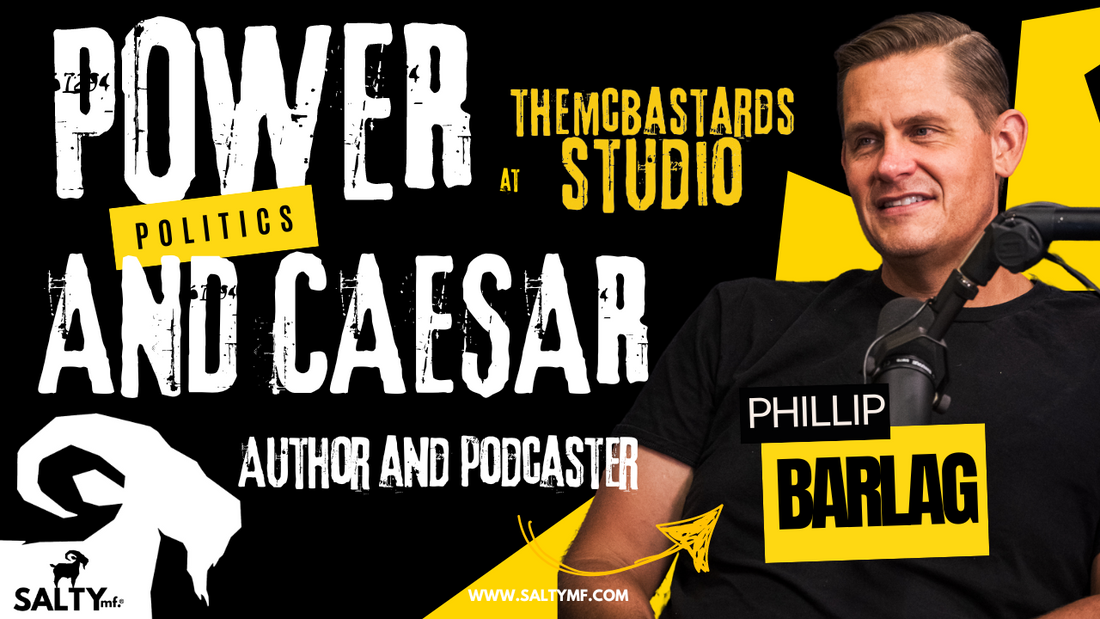
Phillip Barlag: Author & Podcast Host of The Greats of History
The SaltyMF GOAT Podcast with Phillip Barlag Author and Podcast Host of The "Greats" of History.
Phillip Barlag, the Author and Podcast Host of The "Greats" of History, collaborates with Brad Banyas on The SaltyMF GOAT Podcast at The McBastards Studio in FOCO USA.
Their lively discussion delves into the History of Roman Emperors, exploring the remarkable leadership of Julius Caesar and the dark reigns of infamous rulers like Caligula and Nero. Phillip's captivating storytelling breathes life into the ancient world through his writings and podcast episodes.
The "Greats" of History:
The History we did not hear in the Classroom.
Listen
Episode Summary
Brad Banyas interviews Philip Barlag, an author and host of the "Greats of History" podcast, about his passion for history and leadership lessons from historical figures. Barlag shares his fascination with Ancient Rome, sparked by a trip and a curiosity about the Aurelian Walls. He discusses his favorite historical figures, like Cyrus the Great, and least favorite, such as Alexander the Great. Barlag emphasizes the importance of intrinsic leadership and the value of diffusing perceived power. He also mentions his book "Evil Roman Emperors" and the "History of Roman Buildings," recommending them for those interested in learning more about history.
Introduction and Welcome
- Brad Banyas introduces the podcast and expresses excitement about discussing history with Philip Barlag.
- Brad mentions that Philip is an author and host of the "Greats of History" podcast.
- Philip thanks Brad for having him and comments on the unique studio setup.
Philip's Journey into History
- Brad asks Philip how he developed his passion for history.
- Philip shares that he had an interest in history from a young age, particularly in social studies and U.S. history.
- He recounts a pivotal trip to Rome with his wife, which sparked his deep fascination with the Roman Empire.
- Philip describes the experience of seeing the Aurelian Walls in Rome and the curiosity it ignited in him to learn more about history.
Exploring Leadership and Stoicism
- Brad and Philip discuss the resurgence of stoicism and its relevance to historical figures like Marcus Aurelius and Epictetus.
- Philip explains that while cultural values and norms shift, core emotions and human behaviors remain consistent across time.
- He emphasizes that people's reactions to politics and leadership have been constant throughout history.
- Philip notes that studying historical figures makes them feel closer and more relatable, despite the time gap.
Favorite and Least Favorite Historical Figures
- Brad asks Philip about his favorite historical figures and leaders.
- Philip mentions Cyrus the Great as his most improved figure, highlighting his humanity and contributions to human rights.
- He expresses a lack of admiration for Alexander the Great, noting his intolerance and hypocrisy.
- Philip explains that his approach to the podcast is to let listeners draw their own conclusions about historical figures.
Challenges and Rewards of Writing
- Brad inquires about Philip's motivation for starting the podcast.
- Philip shares that he enjoys learning for its own sake and wanted to avoid being one of the many who aspire to write a book without doing it.
- He discusses the challenges of self-publishing and the satisfaction of having an editor validate his work.
- Philip explains that the podcast allows him to share his love for history without the financial burden of selling books.
The Greats of History Podcast
- Brad asks Philip about the inspiration behind his podcast.
- Philip recounts how the idea came to him while hiking and listening to an audio book about ancient history.
- He mentions that the podcast follows historical figures chronologically, starting with Sargon the Great.
- Philip emphasizes the importance of storytelling in making history engaging and accessible.
Leadership Lessons from History
- Brad asks Philip about the leadership lessons he has learned from studying historical figures.
- Philip highlights the importance of intrinsic leadership and aligning visions with others.
- He shares the story of Augustus and his strategy of diffusing the perception of his power by pretending to defer to others.
- Philip explains that effective leaders should avoid throwing status in people's faces and instead create value alignment.
The Colosseum and Historical Anecdotes
- Philip shares a fascinating story about the Colosseum and its origins.
- He explains how Nero's extravagant palace, Domus Aurea, influenced the construction of the Colosseum.
- Philip describes the Colossus of Rhodes statue and its significance in naming the Colosseum.
- He mentions that the brick pediment of the Colossus statue is still visible in Rome, adding to the historical significance of the site.
Recommendations and Final Thoughts
- Brad asks Philip to recommend a book for listeners to start with.
- Philip suggests his book "The History of Roman Buildings," which provides a survey of Roman history through 12 significant buildings.
- He explains that the book is designed to complement travel guides and provide a deeper understanding of Rome's history.
- Philip encourages listeners to check out his podcast, "The Greats of History," available on various platforms.
*Everyone has a story to tell, it may not be perfect nor ideal, but it is Real. The Attitude Wears Well!
www.saltymf.com




